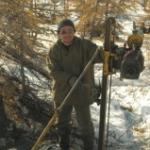Seismic Resilience and Adaptation of Infrastructure and Social Systems to Changing Arctic Environments
Navigating the New Arctic (NNA) is one of NSF's 10 Big Ideas. NNA projects address convergence scientific challenges in the rapidly changing Arctic. The Arctic research is needed to inform the economy, security and resilience of the Nation, the larger region and the globe. NNA empowers new research partnerships from local to international scales, diversifies the next generation of Arctic researchers, enhances efforts in formal and informal education, and integrates the co-production of knowledge where appropriate. This award fulfills part of that aim by supporting planning activities with clear potential to develop novel, leading edge research ideas and approaches to address NNA goals. It integrates aspects of the natural environment, built environment, and social systems to address important societal challenges at this intersection, and engages internationally and with local and Indigenous communities.
Alaska experiences thousands of earthquakes every year, including historical major events that have disrupted and severely damaged infrastructure and lifeline networks. Given the accelerating environmental, ecological, and social changes as the Arctic climate warms, including changes in soil properties, it is critical to understand how infrastructure and society respond to seismic events. Seismic assessments of infrastructure, post-earthquake recovery, and future planning must simultaneously consider natural environment, built infrastructure, and social systems. This project addresses an urgent need for Arctic residents to develop strategies to respond to seismic events. Resilient infrastructure linked with social systems is crucial to the state of Alaska and beyond, which will impact the state’s economic competitiveness, national security, and residents’ safety and health. The project engages Indigenous communities through surveys, local tribal conferences, and public forums as an important way to increase public awareness and involvement in the decision-making process. In addition, the project involves education and outreach efforts including graduate student training in interdisciplinary research, curriculum enhancement and communicating with Indigenous communities to build foundations for future collaboration and engagement.
This award funds the development of a diverse and convergent research team, builds technical and community capacity, and enables planning for an integrated cross-disciplinary and well-defined research strategy to address seismic resilience of Arctic infrastructure and social systems influenced by changes in climate. An initial survey from the University of Alaska at Fairbanks (UAF) students, governmental agencies, and industry along with a discussion session at an Alaska Tribal Conference on Environmental Management informs the planned workshop designed to assess the state-of-the-art and practice and determine research needs, challenges, and priorities. An international workshop is being organized where subject experts from different disciplines and perspectives will collectively envision future research needs and action items to enhance seismic resiliency of Arctic at the intersection of natural, built, and social environments. The workshop brings a group of researchers, stakeholders, and decision makers from the U.S., internationally, and from Alaskan Indigenous communities to exchange knowledge, experience, expectations. The project scope engages Arctic residents through town-hall forums in three local communities, which is a necessary step to build the relationships needed for future co-production of knowledge.
This award reflects NSF's statutory mission and has been deemed worthy of support through evaluation using the Foundation's intellectual merit and broader impacts review criteria.
This collaborative project between Ghayoomi (2022589, UNH) and Kholodov (2022628, UAF) aims to build a research team and plan convergence research to address seismic resilience in Arctic Social Systems from late summer 2020 through 2022. An initial survey of UAF students, government officials as well as a session at the Alaska Tribal Conference on Environmental Management will lay the groundwork for an international workshop in Anchorage to assess state of the art seismic resilience in coastal Alaska and determine research needs. The workshop (planned for year 2) will bring together a team of experts comprised of earthquake engineers, seismologists, permafrost experts and geo-hydrologists, climate scientists, social scientists, urban developers, economists, and social-technical risk and uncertainty experts who will be well-positioned to tackle this problem at the intersection of natural environment, built environment, and social systems. Data gathering, meetings and workshop; no fieldwork will be conducted. The outcome of the initial survey and workshop outcome will be presented and discussed with Arctic community in three town-hall forums.




